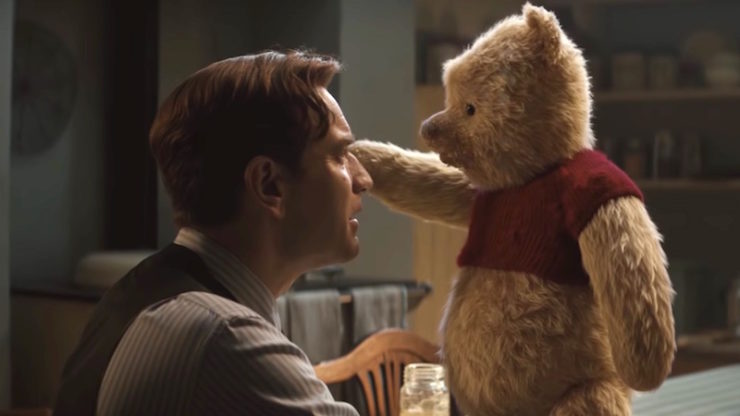With the success of the Paddington films, it seems as though certain parts of Hollywood have recognized that we could all do with more films that are the equivalent of hugs and hot chocolate and warm blankets. And since Disney has their own lovable bear to trot out, it was only a matter of time before we could expect a (slightly) more realistic look at the Hundred Acre Wood and all its inhabitants. Christopher Robin aims to tug at the heartstrings, but gently, and with all the simple wisdoms that A.A. Milne’s books have imparted on generations of readers. It succeeds at this feat particularly well.
[Spoilers for Christopher Robin]
Despite some of the action-oriented trailers, anyone expecting Christopher Robin to be a new generation’s Hook will probably walk out confused. Maintaining the tone of Milne’s work was clearly foremost on the minds of the creative team, and Winnie the Pooh and pals are reliable as they ever were. Christopher Robin, though he is struggling with the demands of being an adult, never becomes callous or distant. In the hands of Ewan McGregor, it is easy to see the boy he used to be, and how simple it might be to reach him again.
The set up of the movie is concise as they come: when Christopher Robin leaves the Hundred Acre Wood behind (as he did in Milne’s stories) it’s because he’s being sent to boarding school. Life promptly takes over, and Christopher is expected to grow up quickly—stop drawing pictures of his friends in the wood, become the “man of the house” after the sudden death of his father, get a job, get married, start a family, go to war. Christopher comes back from his service in World War II not broken, but serious and (though he doesn’t seem to realize it) sad. His job at a luggage-making company is unfulfilling, and his department is under fire to make cuts that could see most of his staff laid off, despite their promise of gainful employment after returning from the war. He thinks sending his daughter Madeline away to boarding school will prepare her for the world, but she hates the thought. He makes promises to spend time with his family, then has to break those promises to for the sake of his work.
And suddenly, when it seems that all of this will amount to an incredibly bleak future, his oldest friend shows up.
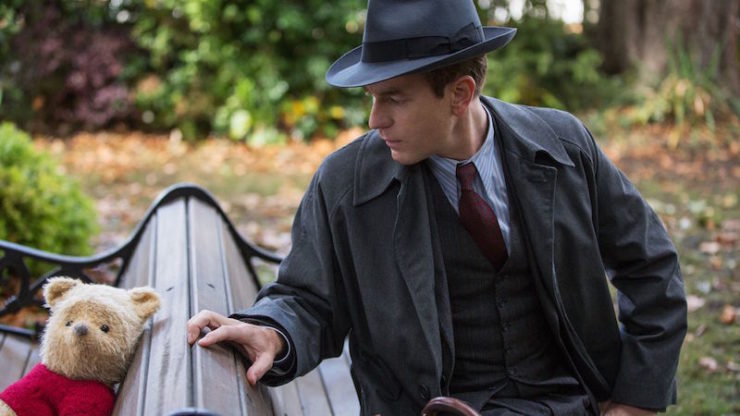
Pooh arrives back in Christopher Robin’s life after being unable to find any of his friends in the Hundred Acre Wood, and deciding to try the door that Christopher used as a gateway for the first time in years. The movie itself is adamant about blending reality and fantasy with very little thought, and that in itself is a delightful exercise—Pooh is a talking stuffed animal and so are most of his friends, but Rabbit and Owl for some reason appear to be real animals that can talk. (Perhaps Christopher noticed real rabbits and owls in the woods and they became his friends in his own imaginary wood because he didn’t have toys of them?) Christopher doesn’t want anyone to notice that his bear pal is talking, but the people who do learn this secret accept it quickly, with less reservation than we might expect. Once the truth is right in front of them, it seems rather pointless to deny it.
Christopher Robin has always been a very special childhood protagonist. In the place of the cruelty of Peter Pan or the mistrust created by years of abuse that we see in Harry Potter, Christopher was always loving, knowledgable, and unfailingly kind to his friends. None of this is diminished in the film, and that would seem to be the entire point of the story; Christopher hasn’t turned into a cutthroat adult with the passage of time, but he has lost the joy in his life. He doesn’t remember how to get it back. When Pooh finds him again, all of these memories are engaged, all the silliness in his life returned. Pooh treks honey all over Christopher’s house, pulls down shelves in the kitchen thinking that they are a ladder, and rather than explode in anger, Christopher simply works to clean up each mess.
There is an explicit lesson in all of this—we’re reminded that Christopher Robin was the guardian of his friends in the Hundred Acre Wood, a role he returns to when he journeys back with Pooh to find his friends. As a father, he has forgotten how to be that guardian—he doesn’t play with his daughter or read fun stories or encourage her artistry. Adulthood has prepared him to be a provider, but prepared him quite poorly for being a caretaker and participant in his own family. The film stealthily posits that the time in our childhoods that we spend imagining and pretending, those are the moments that make us good people. Not school, not work, not duty to our countries, but play. When Christopher is reunited with Pooh, he very quickly resumes his natural role to his old friend, simply takes care of him. He mops up honey tracks and tucks him into bed at night and feeds him his favorite foods.
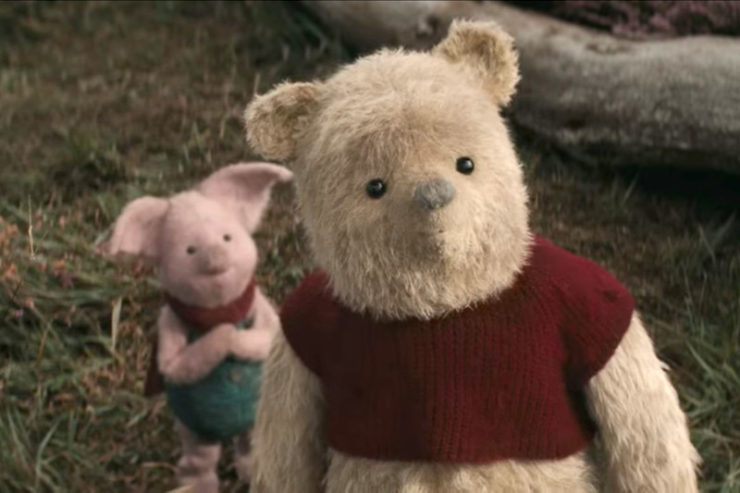
His friends in the Hundred Acre Wood perform this service in kind. Christopher finds that Pooh’s buddies were all hiding away because they believed a Heffalump was coming to get them. When he locates the group they’re convinced that he might be the Heffalump, and so he has to “battle” one at a distance to convince them otherwise. Eeyore sees him do this against an invisible enemy and begins to prop up the game, making Heffalump noises for the group to hear—Christopher Robin is playing again in the Hundred Acre Wood, and it is their job to engage in the game and see it through, as his dearest friends.
Buy the Book
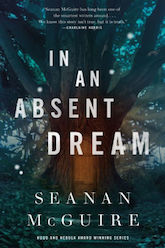

In An Absent Dream
The concept of seeking out joy is also poked at by the premise. When Christopher tries to get Pooh back to the woods behind his family’s cottage to return him home, Pooh requests a red balloon for their train trip. This balloon is something of a talisman by the end of the story; Pooh asks his friend if his “case of important papers” is more important than a balloon and Christopher says that they are, of course, because they are his work. He becomes dismayed with Pooh’s mild obsession over the balloon, but Pooh keeps reiterating how happy it makes him. He tries to stop Pooh from playing a game while they’re on the train, naming the things he sees as they chug by. When they arrive at the cottage, Pooh requests that they leave his balloon there for Madeline, hoping it will make her happy too. She finds it tied to a bench outside and begins to play in earnest with it, batting at it with a tennis racket and engaging in real play perhaps for the first time in her life. At the same time, Christopher is on the train going back home, and finds that he can’t stop himself from playing Pooh’s game as the scenery goes by. Both father and daughter are rediscovering joy and play at the same time.
The things that are valued in the Hundred Acre Wood are not merely the trappings of childhood. The things that Pooh and his friends value are not frivolous. When Pooh sees Christopher’s wife Evelyn through a window, you expect him to say “she is beautiful,” as those are always the words that are uttered whenever a man’s wife or daughter are introduced to another. Instead, he says, “she looks very kind.” Because one of these attributes matters far more than the other. When Christopher finally solves the problem at his job and finally tells off his boss (calling him a woozle while he’s at it), he tells his company that if they would simply give all their workers vacation—time to play—they could sell their luggage to more people and expand their profits. He defends everyone’s right to some joy, to time for the people in their lives, to pretend. The stakes are never that dire (and they never need to be), but the message is as uplifting as they come.
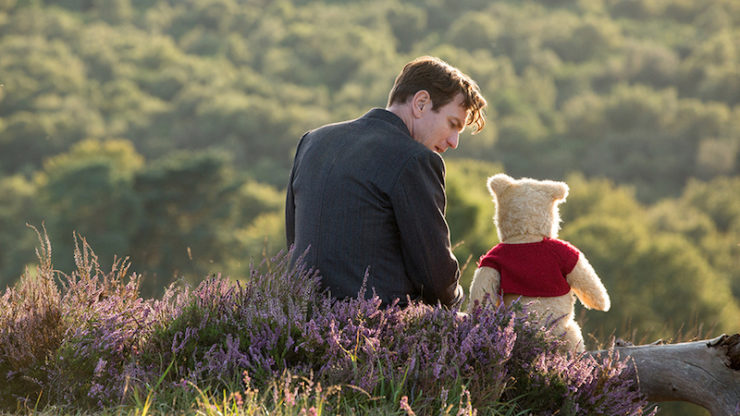
In the end, Christopher, Evelyn, and Madeline all get to enjoy the Hundred Acre Wood together. Christopher Robin wears a sweater vest that rather matches Pooh’s red jumper, the very same shade of that balloon that brought so much happiness into their lives. They picnic and they talk and the world is better for it. Because despite the insistence that we all must leave childish things behind as we grow up, there is no jubilant future in that. Imagination and responsibility are not mutually exclusive. We can grow up and still we can play… because when we do, we are often the best versions of ourselves.
Emmet Asher-Perrin would also like to point out the mid-credits sequence, which features Richard M. Sherman (of the Sherman Brothers) playing “Busy Doing Nothing” on a piano at the beach. You can bug her/him on Twitter and Tumblr, and read more of her/his work here and elsewhere.










